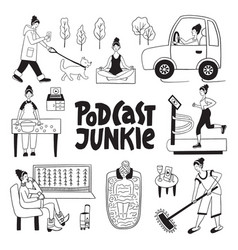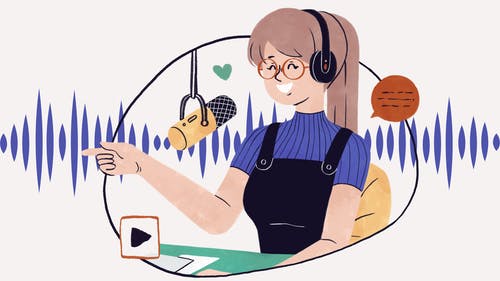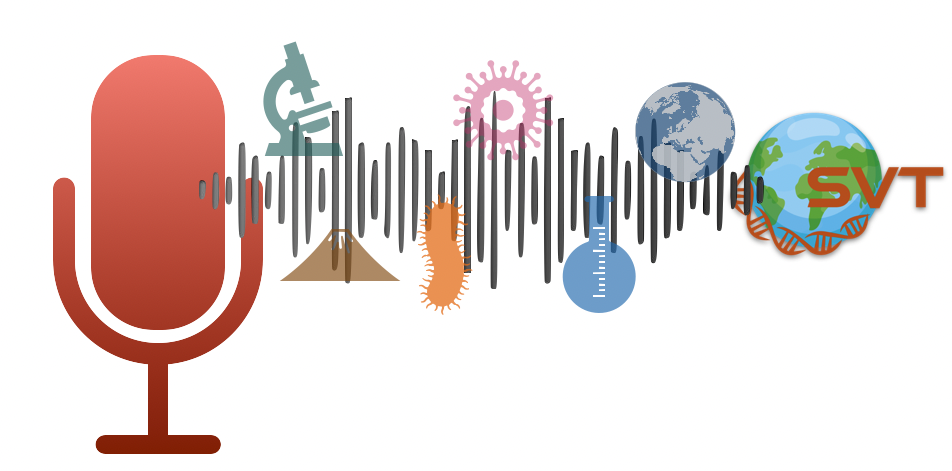Podcast in Science plays a special role in science communication. It invites listeners to follow thoughts and information in a lively way, in other words, to follow an exciting story. Hosts of science podcasts can share not only their knowledge but also their enthusiasm about their discipline, as it can be in biology or in earth sciences.
Work alone
- With the different texts below, do a little summarize about what you have understood and learnt about podcast.
- What is a podcast in science ?

A podcast is an episodic series of spoken word digital audio files about a subject in science that a user can download to a personal device1 for easy listening.
The author of a podcast is often called a podcaster. In actuality, the word “podcast” is an amalgamation2 of “iPod” and “broadcast” and loosely refers to any recorded audio program that contains episodes and can be accessed digitally.
But after this activity, you will become the best podcaster of the world in your subject! We hope…
How can you podcast your works
A podcast is an important technology which is simple and easy to use. What are the steps to create your own podcast and for listening it?

- Create first your own audio about a scientific topic. This audio is built like a presentation, but without a slideshow. So you will have to well describe the contents and to make it live! Then, contents can be captured with portable devices and then upload to a computer.
- Then creators have to post their work to a web server, usually in MP3 way. Then, they have to publish an RSS3 file which contains meta information about the audio file such as the URL4, the file’s name and the summary. For this part of the work you will have to fill a form that your teachers will give you.
- Web publisher have to use an application to identify the multimedia file and its adress (URL). Then the application downloads the URL and synchs5 it to a media player which is incorporated in the website.
- Listeners can download or directly listen the podcast
Why podcasts are dominating the media landscape ?
1. Podcasts allow for multitasking

The main reason why podcasts are so popular is that they allow their audience to save time. For instance, most often people listen to audio blogs at home, in a car, while walking around or working out. What this means is that those who listen to podcasts are doing at least two tasks at the same time, exercising and listening. What are the most spread activities, while listening to podcasts? => housework, driving, cooking or baking. Experiment it !
2. Listening to a podcast is an easy way to catch up6 on the latest news and events

According to The Publisher’s Guide to Podcasting, daily news podcasts is a crowded7 market that is already occupied by media giants such as The Washington Post, The Guardian, The Economist, and The New York Times. The second topic consumers are interested in the most (after music) is news. To keep up with the latest events, people usually listen to podcasts within 24-48 hours of downloading them.
3. Podcast are entertaining 8

In addition to learning new things and finding out the news, people also choose podcasts when they want to entertain themselves. Music, food, sports, thriller, and hobbies are among the most popular podcast categories. Besides, podcasts are also entertaining because of the diversity of formats they have. There are interviews, conversations, late-night shows, fiction and non-fiction storytelling, and of course learning knowledge as you can do on sciences’ subjects.
- 1 appareil
- 2 fusion, amalgame, unification
- 3 Really Simple Syndication : a standardized system for the distribution of content from an online publisher.
- 4 Uniform Resource Locator = Adresse internet (www.vieterre.fr par exemple)
- 5 Synchroniser = Synch / Synched
- 6 To catch up on something gagner du temps sur quelque chose (rappel : to catch caught caught)
- 7 bondé, chargé (crowd veut dire foule, cohue)
- 8 Divertissant entertainement = divertissements
Complément : https://www.nature.com/articles/d41586-019-02096-4

